This article was medically reviewed by Shari Forschen, NP, MA. Shari Forschen is a Registered Nurse at Sanford Health in North Dakota. Shari has worked in healthcare since 1996 and her expertise lies in acute care bedside nursing on a medical oncology floor. She received her degree from Medcenter one College of Nursing in 2003 and her Family Nurse Practitioner Masters from the University of North Dakota in 2014. Shari is a member of the American Nurses Association.
There are 13 references cited in this article, which can be found at the bottom of the page.
This article has been viewed 53,609 times.
Recovering from lost sleep may take more than just a few days of recovery. Not getting enough sleep creates what those in the medical field refer to as a "sleep debt," and sleep debt compounds as you continue to get less sleep than you need. Recovering from lost sleep requires getting additional sleep for a number of days in a row, but it’s important to remember that getting too little sleep regularly can lead to health issues and the best way to recover from lost sleep is really to establish good sleeping habits going forward.
Steps
Understanding Sleep Debt
-
1Settle short-term sleep debt. "Sleep debt" is the term medical professionals use to describe a deficit in the amount of sleep you have gotten versus the amount of sleep you should get. While the exact amount of sleep you need varies from person to person, each hour lost per night can have effects that last for days, weeks, or longer.[1]
- It may be possible to recover from short-term sleep debt and regain normal function by sleeping longer in the days following the lost sleep, but there is no scientific evidence to back up the idea that you can "make up" for lost sleep by sleeping more.[2]
- If, for instance, you lost 10 hours of sleep during one week, you could recover from your sleep debt by sleeping an additional three to four hours during the weekend. Then, during the next week, you would need to sleep an additional hour each day until the debt is "repaid." So, if you slept an extra four hours during the weekend, you would need to add an hour of sleep to your normal seven to nine hours of sleep for the next six days in order to recuperate.[3]
- Even if you make up your deficit with extra sleep, this will not immediately bring you back to normal. Your neural and metabolic systems will take much longer to recover. [4]
- Instead of telling yourself that you can make up for a sleepless night or getting too few hours of sleep every night by sleeping in on the weekend, focus on creating a sleep routine that ensures you get adequate sleep every night.
-
2Understand long-term sleep debt. Long-term sleep debt — or insomnia — is created when you don't get enough sleep on a regular basis for a prolonged period of time. If you stay up late every night, or are simply getting a limited amount of sleep (due to a baby, multiple jobs, studying for school, etc.) for a time that exceeds a week or two, it may take a significant amount of time and rest to compensate.[5]
- If the sleep lost is chronic (greater than one month), it should be addressed by medical professional to identify the cause of insomnia. This may be primary insomnia (caused pain or a disease or condition) or secondary to behavior which causes insomnia (stimulant use before bed, exercise before bed or activating activities, etc.).
- Adults need seven to nine hours of sleep each night. If you need eight hours of sleep but you are only sleeping five hours every weeknight, you will have racked up 15 hours of sleep debt by the weekend. If this continues every week, you will have 60 hours of sleep debt by the end of the month.
- Long-term sleep debt requires a considerable amount of time to "repay" — it will take far more than a few extra hours on the weekend to bring your body back to normal. While sleeping in on the weekend may help you feel more rested on Monday, you will still suffer the neurological and metabolic consequences of lack of sleep — reduced ability to focus, for instance.
- Sleeping late or napping on the weekends may interfere with your circadian rhythm, making it difficult for you to fall asleep at bedtime, thus being counterproductive in fixing the sleeping issue.[6]
- Again, instead of thinking about how you can make up for that lost sleep later, think about how to ensure you get enough sleep every night. Setting a sleep schedule and sticking to it, as well as practicing good sleep hygiene, will help you reach a normal state of alertness and functioning.[7]
Advertisement -
3Figure out how much sleep you need. To figure this out, you can perform a sleep test. Take a few vacation days and clear your schedule as much as possible (at the very least, try to schedule things for the afternoon).[8]
- Go to bed at a reasonable time, or around the time you would like to sleep every night, and turn off your alarm clock.
- Allow yourself to sleep until you wake up naturally, feeling rested. The first few nights you may sleep for a very long time thanks to your sleep debt.
- Go to bed every night at the same time with no alarm. After a few days, you should start to wake up naturally at the same time every morning. This will give you an idea of how much sleep you need each night.
Establishing Good Sleep Hygiene
-
1Establish a sleep schedule. The best way to bounce back from lost sleep and prevent it from happening again in the future is to establish a sleep schedule and stick to it. There are a number of ways you can go about establishing a healthy sleep schedule:[9]
- Once you know how much sleep you need each night, you can work on arranging your life to accommodate that number. This might mean you have to go to bed earlier than you used to (maybe at 10pm instead of 12:30am), or you have to move your 6am workout to a later time.
- Stick to the same schedule as much as possible.
- Ease into your sleep schedule. Try going to bed 15 minutes earlier each night until you reach your new bedtime, rather than making big changes.
-
2Establish a bedtime routine. By sticking to a pre-bedtime ritual, you can train your body to identify signals that it's time to go to sleep. Your bedtime ritual should be relaxing.[10] It may include taking a warm bath or a shower, setting out your clothes for the next day, writing in a journal, reading (but skip crime novels or thrillers or anything that will make you alert), doing evening yoga, or meditating.
- Avoid confrontation or emotionally upsetting conversations at bedtime. If you're upset about something, write it down and tell yourself you will deal with it in the morning. Using positive coping strategies can help avoid negative coping strategies and equate better health in long run — both mentally and physically.
-
3Make your room a sleep sanctuary. A large part of sleep hygiene involves creating the right environment for sleep. Make sure you eliminate all sources of light (with black-out curtains or a sleep mask) when sleeping and avoid using electronic devices before bed. The blue light from these devices (smartphones, tablets, laptops, and TV) can suppress melatonin, which is a hormone that makes you sleepy. Dim your lights around bedtime as well, as bright lights can affect melatonin production.[11]
- Keep your room cool when sleeping. Experts recommend keeping the thermostat set between 60 to 67°F (15.6 to 19.4°C).[12]
- Block out external noises. Use earplugs or a sound machine to block out any sounds that might keep you awake. A fan can be a good source of white noise and keep you cool at the same time.
- Use your bed only for sleeping and sex. Working in your bed or even watching TV in bed can confuse your body. Train it to recognize that when your body hits the mattress, it's time to go to sleep.
-
4Limit your daytime naps. Taking a nap seems like a great way to make up for lost sleep, and it can be in the right circumstances, but you should limit the practice of taking naps during the day in order to ensure you get a full, restful night’s sleep each night.[13]
- Take advantage of napping to help repay short term sleep debt, but limit it to just an hour or two to prevent missing more sleep that night.
- If you find yourself napping regularly, this is a good indication that you are likely not getting enough sleep at night. Consider adjusting your schedule to give yourself more time to sleep, either by going to sleep earlier or waking up later (or sometimes both).
-
5Exercise frequently. Getting exercise can help you to fall asleep easier and stay asleep through the night. If you find that you have trouble sleeping at night and that is causing your lost sleep, adding or increasing exercise in your daily habits can help combat the problem.[14]
- Avoid exercising too close to your bedtime as it may make it difficult to fall asleep. Exercise increases blood flow and releases endorphins into the system, which can increase energy. This can be great to give you energy to power through your day, but can become problematic when you're still feeling the energy-boosting effects and you're trying to relax and fall asleep.
- Some kinds of slow paced exercises like yoga or stretching are okay near bed time and may help you to relax.
-
6Avoid caffeine, nicotine, and alcohol too close to bedtime. Caffeine, nicotine, and alcohol can all negatively affect your sleep. Caffeine and nicotine can make it difficult for you to fall asleep. Alcohol may initially help you drop off, but will cause you to be restless and may wake you up later in the night as your body begins to metabolize it.[15]
- In addition, avoid eating too close to bedtime, as this can disrupt your sleep as well.[16]
-
7Get enough sleep for your age. There are a number of variables that can affect how much sleep you need each night and what is right for another person your age may not be right for you. That said, there are some general guidelines you can follow to establish a sleep pattern, then adjust it to suit your needs.[17]
- People under thirteen years of age should get between ten and thirteen hours of sleep per night.
- Teenagers through seventeen years old should get eight to ten hours of sleep each night.
- Most adults need seven to nine hours of sleep to maintain their health and feel alert during the day.
Noticing Signs of Accrued Sleep Debt
-
1Take note of your daytime sleepiness. Sleep debt can lead to a number of complications in your life. The most prominent and easiest to identify is experiencing sleepiness during your normal daily activities. If you find yourself sleepy during the day, consider why that may be.[18] Are you staying up too late? Does your pet sleep in bed with you and wake you by moving around in the night? Trying to sleep but finding it difficult to fall asleep? Waking up early in morning and unable to fall back asleep?
- Even if you think you get enough sleep, experiencing daytime sleepiness can be an indicator that you should allow yourself to get more, or could it be indicator that there is medical condition that is decreasing oxygenation while you sleep (sleep apnea), periodic limb movement disorder, or restless leg syndrome, or some combination of these things.
- Daytime sleepiness may not be caused simply by not sleeping enough the night before, it could also be indicative of an outstanding sleep debt caused by missing too much sleep on previous nights.
-
2Don’t accept common confusion or reduced attention span. If you find yourself confused or unable to focus on things during the day, it is likely that you have not been getting enough rest. Even if you feel alert and awake, confusion and difficulty paying attention to things is a sign that you need to allow yourself to recover lost sleep.[19]
- If it is difficult to pay attention or understand things on a regular basis, you are likely not allowing yourself to get enough sleep.
- Consider changing your sleeping habits to increase your attentiveness and ability to comprehend things you are working on throughout the day.
- If fixing your sleeping schedule does not resolve these issues, see your doctor for an evaluation. These can be symptoms of other underlying medical disorder as well.
-
3Adjust your sleeping habits based on stress. Another common sign that you are operating with lost sleep is a higher than normal level of stress, or an inability to cope with the type of stress you experience often.[20]
- Lost sleep can inhibit your ability to cope with stressors in your life and make things feel worse than they are.
- Operating at a sleep deficit can make you feel stressed even in the absence of significant stressors.
- If increased stress is causing sleepless nights, consider talking to mental health professional to help you identify signs/symptoms of anxiety, depression, or another possible disorder. A mental health professional can help you learn better ways to cope with stress.
Expert Q&A
-
QuestionHow do I break the habit of not getting enough sleep at night?
 Shari Forschen, NP, MAShari Forschen is a Registered Nurse at Sanford Health in North Dakota. Shari has worked in healthcare since 1996 and her expertise lies in acute care bedside nursing on a medical oncology floor. She received her degree from Medcenter one College of Nursing in 2003 and her Family Nurse Practitioner Masters from the University of North Dakota in 2014. Shari is a member of the American Nurses Association.
Shari Forschen, NP, MAShari Forschen is a Registered Nurse at Sanford Health in North Dakota. Shari has worked in healthcare since 1996 and her expertise lies in acute care bedside nursing on a medical oncology floor. She received her degree from Medcenter one College of Nursing in 2003 and her Family Nurse Practitioner Masters from the University of North Dakota in 2014. Shari is a member of the American Nurses Association.
Master's Degree, Nursing, University of North Dakota You are right — this is a habit. And like most habits, in order to change it, it is necessary to acknowledge the elephant in the room. The first step to change is identifying there is a problem. Everyone will have a restless night occasionally, but consistent restless nights can become problematic in that it can create sleep debt, which interferes with normal body health, mental health and emotional well being. To cure this habit, look at what you are doing in the evenings that is inhibiting your sleep — are you eating too late at night? Are you not active enough during the day? Is there daytime napping happening? Or is there late night television watching, computer work, etc.? Identifying those things and changing them is the first step. The national sleep foundation has many helpful tips in ways to develop a sleep ritual that can help put your mind and body to rest. You can find them at https://sleepfoundation.org/
You are right — this is a habit. And like most habits, in order to change it, it is necessary to acknowledge the elephant in the room. The first step to change is identifying there is a problem. Everyone will have a restless night occasionally, but consistent restless nights can become problematic in that it can create sleep debt, which interferes with normal body health, mental health and emotional well being. To cure this habit, look at what you are doing in the evenings that is inhibiting your sleep — are you eating too late at night? Are you not active enough during the day? Is there daytime napping happening? Or is there late night television watching, computer work, etc.? Identifying those things and changing them is the first step. The national sleep foundation has many helpful tips in ways to develop a sleep ritual that can help put your mind and body to rest. You can find them at https://sleepfoundation.org/ -
QuestionIf I have sleep debt, will not my body regain lost sleep on its own.?
 Shari Forschen, NP, MAShari Forschen is a Registered Nurse at Sanford Health in North Dakota. Shari has worked in healthcare since 1996 and her expertise lies in acute care bedside nursing on a medical oncology floor. She received her degree from Medcenter one College of Nursing in 2003 and her Family Nurse Practitioner Masters from the University of North Dakota in 2014. Shari is a member of the American Nurses Association.
Shari Forschen, NP, MAShari Forschen is a Registered Nurse at Sanford Health in North Dakota. Shari has worked in healthcare since 1996 and her expertise lies in acute care bedside nursing on a medical oncology floor. She received her degree from Medcenter one College of Nursing in 2003 and her Family Nurse Practitioner Masters from the University of North Dakota in 2014. Shari is a member of the American Nurses Association.
Master's Degree, Nursing, University of North Dakota The focus of the article is to give you information to avoid the sleep debt condition. If you continuously have insomnia, this is a condition that can affect your health. If you are able to design a sleep routine that allows you to gain more rest, it will repay in tenfold in areas of health, mental stamina and most likely better relationships as mood will be better as well. The body can not recover the lost sleep on it's own unless habits, conditions affecting sleep are not addressed to help gain more rest and adequate sleep.
The focus of the article is to give you information to avoid the sleep debt condition. If you continuously have insomnia, this is a condition that can affect your health. If you are able to design a sleep routine that allows you to gain more rest, it will repay in tenfold in areas of health, mental stamina and most likely better relationships as mood will be better as well. The body can not recover the lost sleep on it's own unless habits, conditions affecting sleep are not addressed to help gain more rest and adequate sleep.
References
- ↑ http://www.health.harvard.edu/staying-healthy/repaying-your-sleep-debt
- ↑ https://www.cdc.gov/niosh/emres/longhourstraining/debt.html
- ↑ http://www.health.harvard.edu/staying-healthy/repaying-your-sleep-debt
- ↑ https://www.cdc.gov/niosh/emres/longhourstraining/debt.html
- ↑ https://www.sleepfoundation.org/insomnia/what-causes-insomnia
- ↑ https://www.sleepfoundation.org/how-sleep-works/sleep-debt-and-catch-up-sleep
- ↑ https://www.sleepfoundation.org/how-sleep-works/sleep-debt-and-catch-up-sleep
- ↑ https://www.cdc.gov/sleep/about_sleep/how_much_sleep.html
- ↑ https://www.sleepfoundation.org/sleep-hygiene/how-to-reset-your-sleep-routine
- ↑ https://www.heart.org/en/healthy-living/healthy-lifestyle/sleep/how-to-sleep-better-with-a-bedtime-routine
- ↑ https://www.cdc.gov/sleep/about_sleep/sleep_hygiene.html
- ↑ https://health.clevelandclinic.org/what-is-the-ideal-sleeping-temperature-for-my-bedroom/
- ↑ https://www.sleepfoundation.org/sleep-hygiene/napping
- ↑ https://www.hopkinsmedicine.org/health/wellness-and-prevention/exercising-for-better-sleep
- ↑ https://sleepfoundation.org/ask-the-expert/sleep-hygiene
- ↑ https://sleepfoundation.org/ask-the-expert/sleep-hygiene
- ↑ https://www.cdc.gov/sleep/about_sleep/how_much_sleep.html
- ↑ https://www.psychologytoday.com/blog/sleep-newzzz/201311/can-you-ever-really-catch-sleep
- ↑ https://www.psychologytoday.com/blog/sleep-newzzz/201311/can-you-ever-really-catch-sleep
- ↑ https://www.psychologytoday.com/blog/sleep-newzzz/201311/can-you-ever-really-catch-sleep

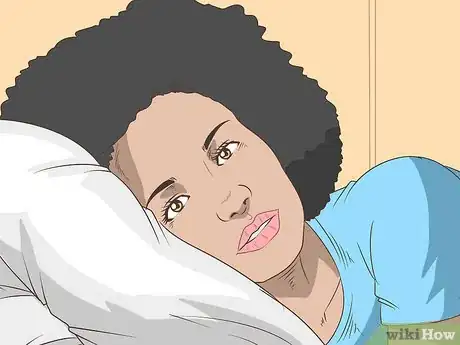

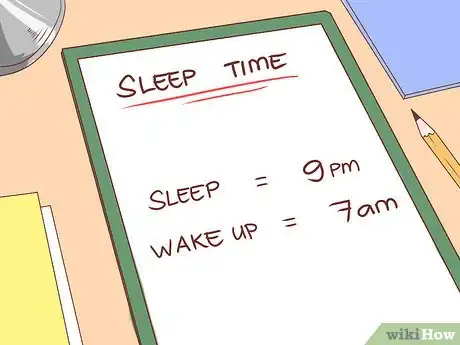

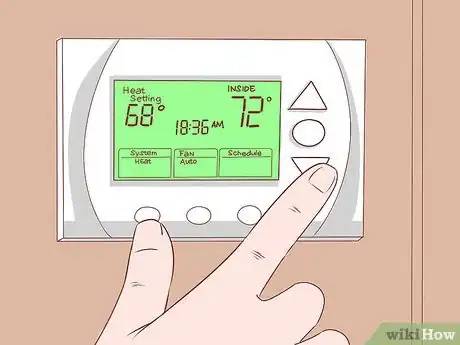



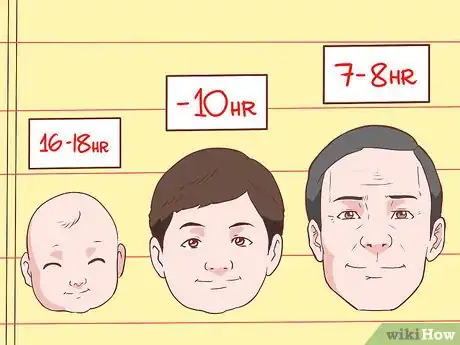

-Step-12.webp)



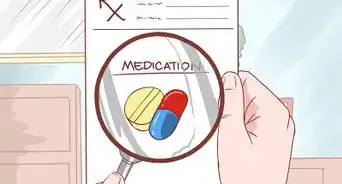


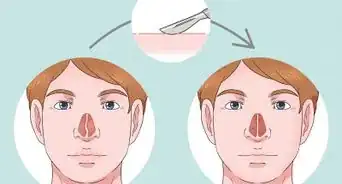




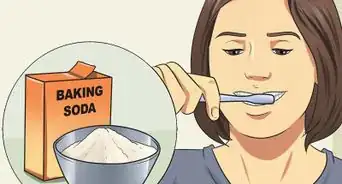
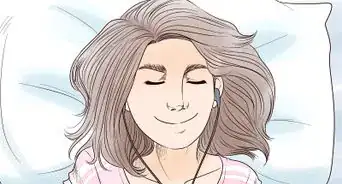

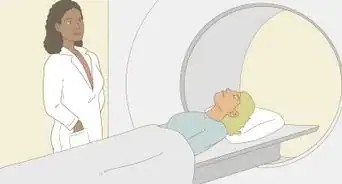










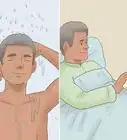
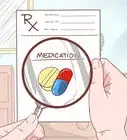




































Medical Disclaimer
The content of this article is not intended to be a substitute for professional medical advice, examination, diagnosis, or treatment. You should always contact your doctor or other qualified healthcare professional before starting, changing, or stopping any kind of health treatment.
Read More...